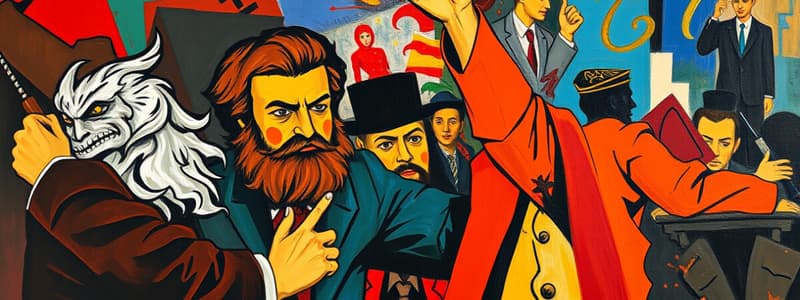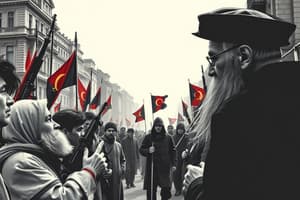Podcast
Questions and Answers
What is the mode of production according to Marx?
What is the mode of production according to Marx?
Organization to produce social relations depend on economy
What do class relations refer to in Marx's context?
What do class relations refer to in Marx's context?
Position within mode of production, ownership of means, relations between
Who does the term bourgeoisie refer to in Marxist theory?
Who does the term bourgeoisie refer to in Marxist theory?
The employers, have capital to invest, own means of production
Define the proletariat as per Marx's definition.
Define the proletariat as per Marx's definition.
What characterizes a post-industrial society according to Dahrendorf?
What characterizes a post-industrial society according to Dahrendorf?
What does Weber mean by economic class?
What does Weber mean by economic class?
What is a social status group according to Weber?
What is a social status group according to Weber?
Define a political party as per Weber.
Define a political party as per Weber.
What are privileges in Weber's definition?
What are privileges in Weber's definition?
What does closure mean according to the definition provided?
What does closure mean according to the definition provided?
Explain status inconsistency.
Explain status inconsistency.
What is the division of labour?
What is the division of labour?
Define Taylorism/Scientific Management.
Define Taylorism/Scientific Management.
What does deskilling refer to?
What does deskilling refer to?
What is a non-standard work arrangement?
What is a non-standard work arrangement?
What is monopoly capital according to Braverman?
What is monopoly capital according to Braverman?
What does alienation mean in this context?
What does alienation mean in this context?
What are class interests?
What are class interests?
Define exploitation as mentioned here.
Define exploitation as mentioned here.
What is a labour union?
What is a labour union?
What is class conflict?
What is class conflict?
What does a classless society mean in Marx's view?
What does a classless society mean in Marx's view?
Flashcards are hidden until you start studying
Study Notes
Key Concepts in Class Conflict
-
Mode of Production: Central to Marx's theory, this refers to how social relations are organized based on the economy's structure.
-
Class Relations: Describes an individual's position within the economic system, detailing ownership and the relationships formed as a result.
-
Bourgeoisie: The capitalist class that owns the means of production and invests capital; they play a key role in the economy.
-
Proletariat: The working class that lacks capital and must sell their labor to survive; vital in Marx's exploration of class struggle.
-
Post-Industrial Society: Dahrendorf identifies this as a shift from an industrial-based economy to one centered on services and knowledge, resulting in decreased manual labor.
Weber's Perspectives on Class and Society
-
Economic Class: According to Weber, this is determined by market situation and the access one has to property regarding economic standing.
-
Social Status Group: Relates to societal clout and prestige, questioning whether individuals are considered noble or worthy.
-
Political Party: Defined by Weber as a collective aiming for similar ends to influence governance and societal outcomes.
-
Privileges: Rights or opportunities that are exclusive to certain social groups, reflecting disparities in access and power.
-
Closure: The intentional act of monopolizing access to privileges, effectively maintaining social stratification.
Social Dynamics and Work
-
Status Inconsistency: Occurs when individuals rank differently across multiple social class systems, leading to unique social identities.
-
Division of Labour: A principle where tasks are divided so each worker specializes, enhancing productivity and efficiency.
-
Taylorism/Scientific Management: A management theory that treats workers like machinery to achieve peak operational efficiency.
-
Deskilling: The process of reducing the skill required for jobs, often due to technological advancements or strict divisions of labor.
-
Non-Standard Work Arrangement: Characterized by short-term, low-skill jobs providing little job security and limited future prospects.
Economic and Class Structures
-
Monopoly Capital: Braverman's term for large corporations that dominate the economy, influencing market structures and labor dynamics.
-
Alienation: A psychological state where individuals feel disconnected from their work, their lives, and their communities, leading to a sense of powerlessness.
-
Class Interests: Goals and aspirations shaped by one's class position, often predicting behavior and social engagement.
-
Exploitation: The act of leveraging a dominant position to extract labor or resources from a weaker counterpart, fundamental in Marxist theory.
-
Labour Union: An organization formed by workers to negotiate for better wages and working conditions, providing collective strength against employers.
Class Dynamics
-
Class Conflict: The social struggle arising from conflicting interests between different classes, a key theme in the analysis of societal structures.
-
Classless Society: Marx's ultimate vision where class distinctions are abolished, aiming for a society where no individual holds power over another, leading to equity and justice.
Studying That Suits You
Use AI to generate personalized quizzes and flashcards to suit your learning preferences.




